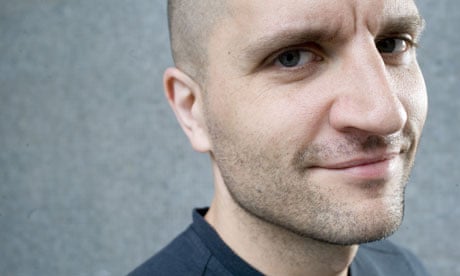His first venture into crime fiction – albeit with a fantastical edge – has won China Miéville the UK's most prestigious science fiction prize, the Arthur C Clarke award, for an unprecedented third time.
The City and the City is set up as a straightforward crime novel: in the dilapidated city of Beszél in eastern Europe, Inspector Tyador Borlú of the Extreme Crime Squad is trying to solve what initially looks like a routine case. But as he looks deeper into the murder of a mysterious woman, he discovers that she has links to Ul Qoma, a city that exists in the same physical space as Beszél but whose inhabitants studiously ignore any sign of overlap.
The novel won the British Science Fiction Association prize for best novel earlier this month, when BSFA journal editor Niall Harrison predicted it was set to take a slew of further prizes. Miéville pronounced himself "absolutely gobsmacked" and "incredibly honoured" to win the Arthur C Clarke, an award originally established by Clarke himself to help promote science fiction in Britain. "It's very different from most of my other books," said Miéville, who has previously won the Arthur C Clarke with more traditional fantasy novels Perdido Street Station and Iron Council. "It was very much written in an effort to be absolutely faithful to works of crime fiction. Crime readers will denounce a book because it has 'cheated,' and I wanted to write a book that didn't cheat, that was faithful to crime rules and that if you'd never read any fantasy you could pick up."
Miéville triumphed over a shortlist also featuring former winner Gwyneth Jones, American author Kim Stanley Robinson, Adam Roberts, Chris Wooding and Marcel Theroux to take the prize, an engraved bookend and a cheque for £2,010, this evening. "It was particularly difficult for judges to pick a winner this year," said chair of judges Paul Billinger. "China eventually won because of the intricacy of the book and the way the whole of the concept expands from the initial premise into the different types of city. The way that was done was so clearly and cleverly written."
Billinger called The City and the City "superb" and "very different from China's other books – almost more restrained, in a good way. The judges have always been open to any type of book which comes within the realm of science fiction – the crime element doesn't exclude it – so we are really pleased it's won." The novel is also shortlisted for major American science fiction and fantasy awards the Nebulas.
Miéville said that some people had questioned whether The City and the City was really science fiction or fantasy. "I think these debates are silly – genre is a moveable feast, but some people do ask these questions," he said. "What I don't want to do is disavow the fantastic tradition I come from. This is a book from within the fantasy tradition, which hopefully can also be a perfectly faithful crime book – and a good book."
Previous winners of the Arthur C Clarke include Margaret Atwood, who won the inaugural award for The Handmaid's Tale in 1987, Christopher Priest, Geoff Ryman and Richard Morgan.
